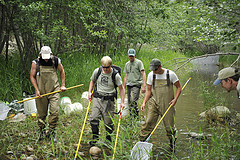April 2016: Read about the recent article in the journal of the American Fisheries Society on Intensively Monitored Watersheds. The peer-reviewed research is one of many published each year in scholarly journals assessing the progress of federal agency programs to protect fish in the Columbia River Basin.
Hundreds of projects to improve fish habitat, fish passage and fish health are underway throughout the Northwest. Because these projects are focused on results, they all include some monitoring component to help ensure that they are achieving their intended biological objectives. Collectively, these efforts are identified as research, monitoring and evaluation (RME).
The agencies incorporate the findings from the RME into future projects. In this way, the agencies continually improve their actions for fish, refining existing actions and adding new ones. This process is known as adaptive management. (See box, right.)
Forums such as the Pacific Northwest Aquatic Monitoring Partnership (PNAMP) and Columbia Basin Fish and Wildlife Authority (CBFWA) help project managers and researchers coordinate their individual activities and learn from their results.

Bureau of Reclamation stream surveys